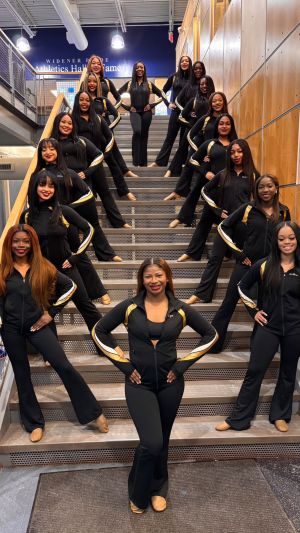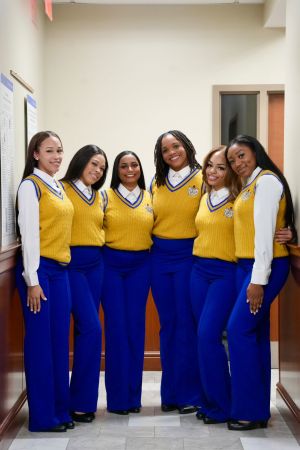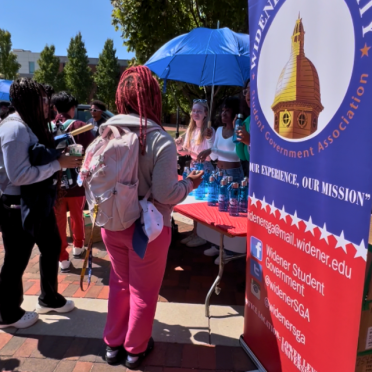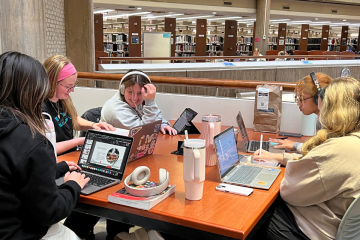A Place of Their Own: Widener Students Creating Clubs that Foster Community

Finding and building community.
That’s what Widener officials are crediting for the spike in student-run clubs and organizations, as well as participation in those groups.
In the 2023-24 academic year, Widener saw a 20 percent growth in new student groups, and a further 8 percent in fall 2024. This spring, the university has approved, or is in the process of approving, another 11 organizations, for a total of nearly 90 campus groups.
“Students are looking for ways to get connected. They want to be engaged in so many ways,” said Victoria Fine, director of student organizations.
And Widener’s growth in student organizations, and participation, is bucking the national trend in higher education, say campus officials.
In the last two years, Widener welcomed its two largest first-year classes in school history, and while Fine says the increased student population has certainly played a part in this growth, most of the new clubs are actually being started by upper class students.
“The organization growth is happening internally. It’s really about creating that space on campus,” said Fine, noting it’s also fairly simple to start and get a new club approved.
Widener is especially seeing an increase in special interest groups and organizations that represent different cultural identities and backgrounds. Among the newest groups: African Culture and Excellence, First Love Widener (a Christian group), Iconic Era modeling troupe, the Illustrious Lionettes majorette team, Widener Anime Club, and Mediums of Art Club.
Widener clubs are open to all undergraduate students regardless of their background.
Favour Kamara ’27, a computer science major and an artist, noticed that Widener didn’t have a general art club, so she helped get Mediums of Art off the ground this spring. It already has 38 members.
“Our goal is to welcome in people interested in all different mediums of art. It’s very broad and open, and we want to teach other members about art,” said Kamara.
Kamara says she and her fellow students are turning their hobbies into clubs. “It shows how many people are actually interested in something, and it makes me want to interact with the school more.”
Kamara is part of several clubs, including cultural and ethnic based ones like Latinos Unidos, even though she is not of that cultural origin.
Actively engaged students like Kamara say that they enjoy being involved on campus, meeting new people, and leaving a mark.
“I want to affect things,” said Isaiah Mines ’28, a member of Student Government Association, or SGA. “And it’s been an opportunity to meet new friends. Even from the start of this semester, I wave to more people on campus because I know them.”
This May, Widener welcomed its fourth historically black, or Divine 9, sorority to campus, with a chapter of Sigma Gamma Rho Sorority, Incorporated. The new organization also joins three Divine 9 fraternities already on campus.
Lezlie Blair, director of Fraternity and Sorority Life, is seeing the increased interest in cultural-based organizations firsthand. In addition to the new Divine 9 organization, there has been interest in bringing a Latin-based sorority to campus.
Much like the other student-led organizations, participation in fraternities and sororities has spiked across all four Greek councils, with the university gradually returning to pre-Covid recruitment levels.
The National Pan-Hellenic Council saw its membership jump 48 percent between fall and spring semester, while the College Panhellenic Council rose from 49 members in fall to 66 this spring. The academic, service-based, and professional fraternity and sorority groups are also seeing positive growth.
“It’s all about a sense of community,” said Blair. “We’re looking into how students are joining, why they’re joining. It can be hard to make friends; there’s not a lot of time to make friends anymore. But by joining these organizations, students can find community and be part of something larger.”
One of the most noticeable areas of increased student involvement has been within SGA. There has been so much interest that the organization voted to amend its constitution and bylaws to expand the number of senators for each class and create committee positions and a board of directors to allow more student participation.
“Many first-year students are getting opportunities. They don’t have to wait. And it’s building leadership opportunities,” said Fine.
Karr Small is among those first-year students who has joined SGA.
A psychology / pre-medicine major, Small wanted to get involved the moment he stepped foot on campus.
“I was always told the best part of college was getting involved,” said Small, who is part of the SGA dining committee this year and has been appointed as its incoming director. "This is my college experience, and I can actually do something about it. I want to be part of something that causes change and do my part to make it a bit better."
Plus, Small loves food.
Small, who will also serve on the SGA’s newly formed board of directors next year, encourages others to follow his example and get involved.
“Just go for it. Ninety-nine percent of the time you’ll find interests that align with you, you’ll make friends, and it can be the catalyst for something bigger,” said Small. “There’s something for everyone on campus and even if you don’t feel like you found your niche, it’s so easy to start a club.”






